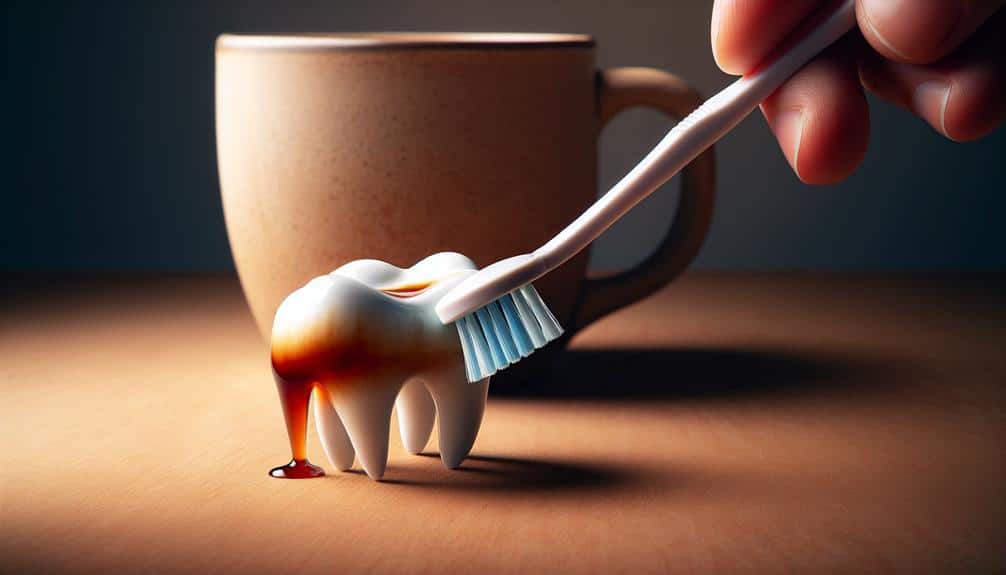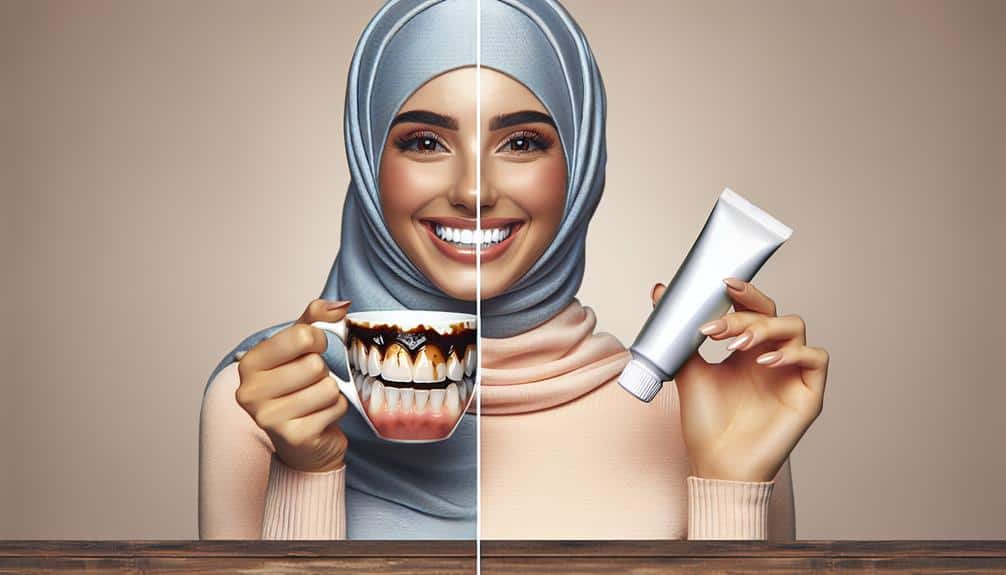To remove tea stains from your teeth, try baking soda to scrub the surface stains away. Oil pulling with coconut oil reduces bacteria and plaque buildup. Hydrogen peroxide can naturally whiten your teeth. Use these home remedies for effective results. For stubborn stains, consider professional whitening options like dental bleaching or laser whitening. After removal, use a soft-bristled toothbrush, floss daily, and maintain good oral hygiene practices to prevent new stains. Preventive care is key to a bright smile. Expert tips and tricks can further assist in your journey towards stain-free teeth.
Key Points
- Brush teeth with baking soda to scrub away tea stains gently.
- Consider oil pulling with coconut oil to reduce bacteria and plaque.
- Use hydrogen peroxide as a natural whitening agent for teeth.
- Opt for natural remedies to brighten teeth effectively.
- Try DIY tricks to combat tea stains without harsh chemicals.
Types of Tea Stains on Teeth
Tea stains on teeth vary in color and intensity depending on the type of tea consumed. Green tea, known for its health benefits, can also lead to stains on teeth due to its high tannin content. These stains tend to be light brown in color and can be relatively easier to prevent with good oral hygiene practices. On the other hand, black tea, a popular choice among tea drinkers, contains more tannins than green tea, resulting in darker and more stubborn stains on teeth.
Tea stain prevention is key to maintaining a bright smile. Regular brushing with a whitening toothpaste can help prevent tea stains from setting in. Additionally, rinsing your mouth with water after consuming tea can reduce the contact time between the tea and your teeth, minimizing the potential for staining.
When it comes to stain removal techniques, professional dental cleanings are effective in removing stubborn tea stains that regular brushing may not eliminate. Dentists can also provide teeth whitening treatments to help restore the natural color of your teeth and reduce the appearance of tea stains.
Common Causes of Tea Stains
Tooth discoloration caused by tea stains is primarily attributed to the tannins present in the beverage. Tannins are a type of polyphenol compound found in various plants, including tea leaves. When you consume tea regularly, especially dark teas like black tea, these tannins can adhere to the enamel of your teeth, leading to stains over time.
The impact of diet on tooth staining is significant, as consuming highly pigmented foods and beverages like tea can exacerbate the issue. Additionally, your toothbrush techniques play an important role in preventing and reducing tea stains. Proper brushing techniques, such as using a soft-bristled brush and gentle circular motions, can help remove surface stains before they become deeply embedded.
Being mindful of your diet choices and implementing effective toothbrush techniques can help minimize the staining caused by tea and maintain a brighter smile.
Effective Home Remedies
Consider incorporating natural remedies into your oral care routine to help combat tea stains on your teeth effectively. Some DIY tricks can help brighten your smile without harsh chemicals.
One popular natural remedy is baking soda. Its mild abrasive properties can gently scrub away surface stains on teeth. Create a paste by mixing a small amount of baking soda with water and brush your teeth with it a few times a week.
Another effective method is oil pulling with coconut oil. Swishing coconut oil in your mouth for about 15-20 minutes can help reduce bacteria and plaque that contribute to staining.
Additionally, hydrogen peroxide, when used in small amounts and properly diluted with water, can act as a natural whitening agent. You can use it as a mouthwash or mix it with baking soda for a more potent stain-fighting solution.
Professional Whitening Options
To further enhance the brightness of your smile and address stubborn tea stains, exploring professional whitening options from your dentist can provide lasting and effective results. Cosmetic dentistry offers various dental bleaching methods that can greatly whiten your teeth. In-office treatments are popular choices for those seeking quicker and more dramatic results.
One common professional whitening option is laser whitening, where a bleaching agent is applied to your teeth, and then a laser is used to enhance the whitening process. This method is known for its efficiency and ability to tackle tough stains, including those from tea.
Consulting with your dentist is essential to determine the most suitable whitening treatment for your specific needs. They can assess the severity of the tea stains on your teeth and recommend the best course of action. Professional whitening options not only provide visible results but also make sure that the procedure is conducted safely and effectively, giving you a brighter and more confident smile.
Preventing Tea Stains After Removal
Implementing good oral hygiene practices can help in preventing tea stains from reappearing on your teeth after professional removal. To guarantee long-term solutions and maintain a bright smile, consider the following preventive measures:
- Brushing Technique: Use a soft-bristled toothbrush and brush in gentle, circular motions to remove plaque and prevent staining.
- Regular Flossing: Flossing daily helps to clean between teeth where your toothbrush may not reach, reducing the chances of tea stains developing.
- Routine Dental Cleanings: Schedule regular dental cleanings to eliminate any stubborn stains and plaque buildup, keeping your teeth healthy and free from discoloration.
Frequently Asked Questions
Can Tea Stains on Teeth Be Reversed Completely With Home Remedies or Professional Whitening Treatments?
You can reverse tea stains on teeth completely with professional whitening treatments. Home remedies may help, but for lasting results, professional care is key. Prevent future stains by maintaining good oral hygiene habits.
Are There Certain Types of Teas That Are More Likely to Cause Stubborn Stains on Teeth?
Certain types of teas, especially those high in tannins like black tea, are known to cause stubborn stains on teeth. To prevent tea staining, consider opting for lighter teas or rinsing your mouth after consumption.
How Long Does It Typically Take to See Noticeable Results When Using Home Remedies to Remove Tea Stains From Teeth?
Typically, noticeable results from home remedies for tea stains on teeth can be seen in a few weeks. Consistent daily use enhances effectiveness. For maintenance, continue with the remedies to guarantee long-term improvement in teeth discoloration.
Are There Any Specific Foods or Drinks That Should Be Avoided to Prevent Tea Stains From Reoccurring After Removal?
Pause partaking in pigment-potent potables. Preventive measures entail evading excessive consumption of tannin-rich teas. Dietary restrictions include minimizing dark dyes like coffee and red wine. Diligence deters dental discoloration; defend your bright smile.
Is It Possible to Prevent Tea Stains on Teeth Altogether, or Are They Inevitable for Regular Tea Drinkers?
You can prevent tea stains on teeth by practicing good dental care. Consistent oral hygiene routines, like brushing and flossing, can help minimize staining. Regular dental check-ups and cleanings also aid in tea stain removal and maintaining oral health.



